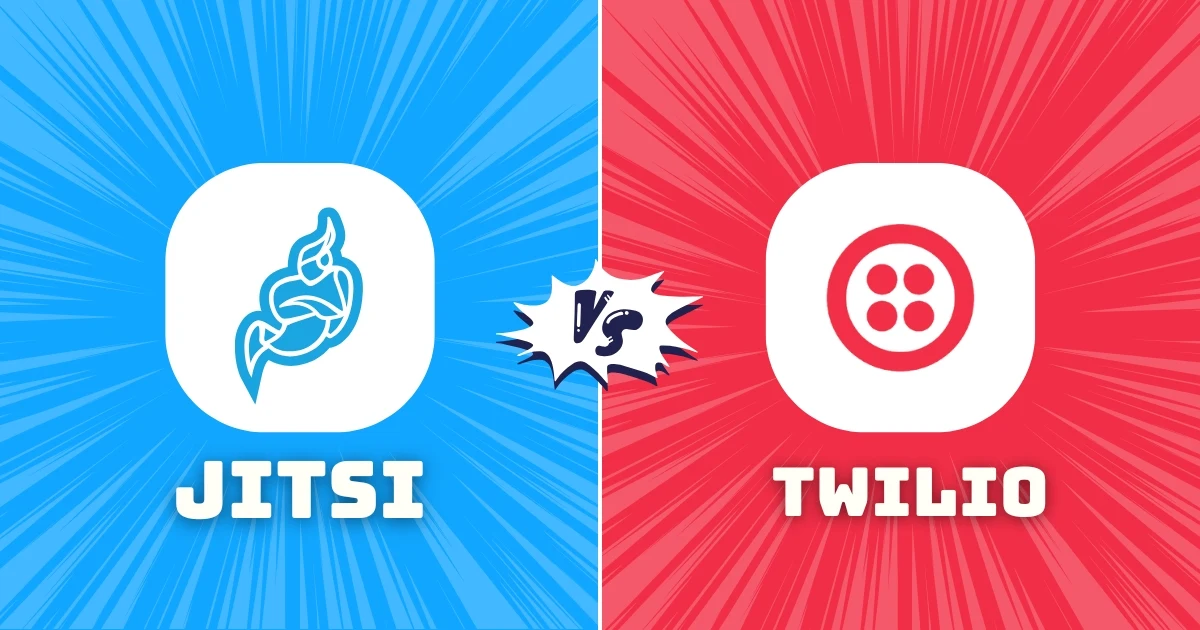Introduction
In today’s world, where online communication is the new normal, choosing the right video conferencing platform can make or break your digital experience. In this guide, we’ll break down the key differences between Jitsi vs Twilio to help you decide which one fits your needs better in 2025.
Whether you’re building a video app, hosting webinars, or looking for private video meetings, Jitsi and Twilio offer very different solutions. This guide is based on hands-on experience, community reviews, and real-world implementation to give you a trustworthy, simple breakdown.
What is Jitsi?
Jitsi is an open-source video conferencing platform known for being free, secure, and customizable. It’s especially popular among developers and privacy-conscious users who want full control over their video infrastructure.
Key Features of Jitsi:
- 100% free and open-source
- Self-hosting or cloud-based options
- No account required for joining
- Screen sharing and chat features
- End-to-end encryption available
- Can be integrated with other tools like Slack and Mattermost
What is Twilio?
Twilio is a cloud communications platform that offers APIs for video, voice, SMS, and more. Twilio Video is a developer-first platform that lets you build custom video applications tailored to your business needs.
Key Features of Twilio Video:
- Developer-friendly APIs
- Global infrastructure with low latency
- Prebuilt UI options or fully customizable layouts
- Scalable for enterprise applications
- Real-time network quality monitoring
- Excellent customer support and documentation
Jitsi vs Twilio: A Head-to-Head Comparison
1. Pricing
Jitsi
- Completely free if self-hosted
- Free public instance at meet.jit.si
- You pay only for hosting/server costs (if self-hosted)
Twilio
- Pay-as-you-go model
- Charges based on participant minutes
- $0.004 per participant/min for peer-to-peer
- $0.01 per participant/min for group rooms
Verdict:
Jitsi is the clear winner for cost-conscious users or small teams. Twilio is better suited for businesses with specific needs and a budget.
2. Ease of Use
Jitsi
- Simple, click-and-go interface
- No sign-up required for basic use
- Great for quick, ad-hoc meetings
Twilio
- Requires developer knowledge to set up
- Best suited for building custom platforms
- Offers SDKs for web, iOS, and Android
Verdict:
Use Jitsi if you need something fast and easy. Choose Twilio if you want full customization and have developer resources.
3. Security and Privacy
Jitsi
- Supports end-to-end encryption (experimental)
- Fully open-source — code transparency
- You control your own data if self-hosted
Twilio
- Uses industry-standard security
- SOC 2, ISO 27001, GDPR compliant
- Handles data securely on their cloud
Verdict:
Jitsi is ideal for privacy enthusiasts. Twilio provides enterprise-grade security but stores data in the cloud.
4. Customization and Flexibility
Jitsi
- Highly customizable if self-hosted
- Modify UI, add integrations
- Can be tricky for non-developers
Twilio
- Designed for full customization
- Build your own video app from the ground up
- Ideal for developers and large teams
Verdict:
Twilio shines for advanced custom apps. Jitsi is flexible but better for simpler custom needs.
5. Performance and Reliability
Jitsi
- Works well for small to medium groups
- May need performance tuning when self-hosted
- Public instance can be slower
Twilio
- Global infrastructure with data centers
- Optimized for quality and low latency
- Scales easily for thousands of users
Verdict:
Twilio wins for high-quality, large-scale applications. Jitsi is reliable but needs configuration for bigger use.
6. Use Case Scenarios
| Use Case | Jitsi | Twilio |
|---|---|---|
| Team Meetings | Yes | Yes |
| Custom Video App | Limited | Excellent |
| Privacy-First Meetings | Best | Cloud-based |
| Webinars | Possible. | Advanced |
| Enterprise Scalability | Requires effort | Designed for it |
When to Choose Jitsi
- You need a free, simple solution for video calls
- You want to host your own server
- You care deeply about privacy
- Your team size is small or medium
- You don’t need extensive custom features
When to Choose Twilio
- You’re building a custom video app
- You need high performance and scalability
- Your business requires global reach
- You have development resources
- You need reliable customer support
Conclusion: Jitsi vs Twilio—Which One Wins?
In the end, it’s not about who’s better. It’s about what you need.
Choose Jitsi if you want a secure, free, and simple way to host or join meetings without depending on big tech.
Choose Twilio if you want to build powerful, custom video solutions with enterprise features.
Got questions or need help setting up Jitsi? Contact us — we provide expert Jitsi installation, scaling, and customization services.
